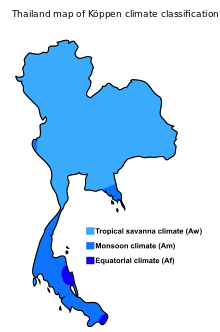
- AIRPORT TAX
- CLIMATE
- CLOTHING
- CURRENCY AND EXCHANGE
- CUSTOMS REGULATIONS
- DRINKING WATER
- ELECTRICITY
- FOOD AND DINNING
- GENERAL ADVICE
- GETTING THERE
- HEALTH REQUIREMENT
- INTERNET
- LANGUAGE
- LOCAL TIME AND WORKING HOURS
- PASSPORT AND VISA
- PORT AND COMMUNICATIONS
- RELIGION
- SAFETY AND SERCURITY
- SHOPPING
- SOME FAST FACTS
- TIPPING
Thailand enjoys a tropical climate with three distinct seasons:
- Hot Season: March - May
- Rainy season: June - October
- Cool season: November - February
The average annual temperature is about 28°C.
The northern region can be a bit cold during the cool season so be sure to bring along a sweater or a light jacket if you intend to visit this region around that time of the year. During the rainy season, downpours hardly last more than a couple of hours.
Currency
The Thai monetary unit is the baht. There are 100 satang to 1 baht. Coins are used in denominations of 25 satang, 50 satang, 1 saht, 2 baht, 5 baht and 10 baht. Bank note denominations comprise 20 baht (green), 50 baht (blue), 100 baht (red), 500 baht (purple) and 1000 baht (gray). Notes are also scaled in size; the larger the denomination, the larger the note.
Money Exchange
Money and traveller's cheques of all major currencies can be exchanged at hotels, banks, exchange booths and mobile exchange kiosks in tourist areas. Banks usually offer the best rates.
Credit Cards
Credit cards are widely accepted in department stores, major hotels, up-market shops and restaurants. They can also be used for cash advances at banks and exchange counters. The most commonly accepted cards are VISA and MasterCard, followed by American Express, JCB and Diners Club.
Import/exports of the Following Goods are Strictly Prohibited
Importation of all kinds of narcotics (opium, heroin, cocaine, etc.) and pornographic media are strictly prohibited. Firearms and ammunition can be imported only after a permit has been obtained from the local police department. A reasonable amount of clothing for personal use, toiletries and professional instruments can be brought in free of duty.
The Following Articles are Exempt from Duty
200 cigarettes or smoking materials in total of 250 grammes, one litre of wine or spirits, one video camera, five rolls of still film, three rolls of video film, and one item of electrical goods per person are allowed in duty free.
Note
Buddha images, antiques or fragments thereof are not allowed to be taken out of Thailand without authorisation from the Fine Arts Department.
Essential Tips for Shopping in Thailand
No doubt, travelling in Thailand is thrilling — and its shopping scene doesn’t disappoint. But with so many skyhigh shopping malls, massive markets, and hi-so boutiques, visitors need to know the do’s and don’ts of shopping in this exotic country.
Shopping Hints and Tips
Bargain
Thai prices will vary greatly — it’s expected that customers will bargain for a lower price. You can try for a 10% to 50% discount at a market. Shopping around to find out the best rate also helps. Know how much you want to spend, stand your ground, and be friendly!
VAT Refund
When exiting the country, you can receive a refund for goods you purchased inside Thailand. Have all your receipts, VAT refund forms, passport and goods ready to show at the refund counter at the airport before your departure. The service fee costs 100 baht, and total value of your goods purchased must be over 5,000 baht.
Payment
Shopping malls accept the majority of major credit cards, with extra fees for international payments. This often makes cash the most cost effective way to buy things. Particularly at markets, bartering with baht is a better strategy.
Return / Exchange
Be sure to return or exchange goods within 7 days of purchase at department stores. Small stores and markets will likely not accept returns or exchanges. Try clothes on whenever possible, as Asian sizes vary in fit. When buying electronic items, check them for functionality and keep all receipts.
Thailand, officially known as the Kingdom of Thailand, covers an area of 514,000 square kilometres. It is similar in size to France and has a population of about 60 million. Approximately 95% of Thai citizens are Buddhists. The remainder of the populace is comprised of Muslims, Christians and Hindus. Geographically, Thailand is divided into four main regions: the central plains, the north, the northeast and the south. The majority of the population lives in the fertile central plains, where the capital city of Bangkok is located. The northern region, dominated by Chiang Mai (Thailand's second largest city), is an area of mountains and fertile valleys. In contrast to the central and northern regions, the northeast has harsh climatic conditions and is the least fertile region of Thailand. The south is famous for its fine beaches and idyllic limestone islands.
Thailand proudly proclaims that it has never been colonised. One positive aspect of this fact is that the country has retained its unique culture, traditions and language. With a long, rich heritage and abundant natural resources, Thailand is without doubt one of the most exotic countries in Asia.